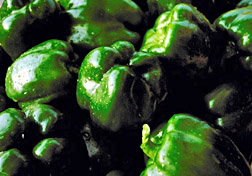|

ARS researchers have identified three beneficial
bacteria that can inhibit the growth of pathogens on fresh fruits and
vegetables. The bacteria were tested by dipping peppers in solutions with the
beneficial bacteria. Photo courtesy of USDA.
|
|

|
Beneficial Bacteria Help Control Produce
Pathogen
By Laura
McGinnis June 2, 2008
A new food safety treatment developed by the
Agricultural Research Service (ARS) could
increase the effectiveness of conventional produce sanitization methods.
ARS microbiologist
Ching-Hsing
Liao developed and tested the method, which pits beneficial bacteria
against potentially harmful ones. The beneficial bacteria inhibit the growth of
pathogens that survive initial physical or chemical attempts to remove them
from fresh produce. Produce pathogens are a prominent source of food-borne
illness in the United States.
At the ARS
Eastern
Regional Research Center (ERRC) in Wyndmoor, Pa., Liao identified three
beneficial bacterial antagonists for use in food safety intervention. He dipped
bell peppers in solutions of water containing the beneficial antagonists and
examined the effect on surface pathogens such as Salmonella and E.
coli O157:H7.
One bacterium, known as Pseudomonas fluorescens 2-79, was
particularly effective. Dipping peppers in a Pf 2-79 solution for about two
minutes halted pathogen multiplication almost entirely.
On untreated peppers, pathogen populations multiplied about 100,000
times when stored at 68 degrees Fahrenheit for two days. But treating peppers
with Pf 2-79 suppressed pathogen growth. This treatment could potentially
prevent pathogens from proliferating to numbers capable of causing human
illness.
The dip also stopped the growth of two common spoilage bacteria and
reduced the development of soft rot.
Pf 2-79 is easy to grow and can colonize several types of produce.
Because it can grow at refrigeration temperatures, it could be an effective
control agent for cold-tolerant pathogens such as Listeria monocytogenes
and Yersinia enterocolitica.
Liao and his colleagues plan to validate the research on a larger
scale. Their research will also aim to identify additional bacterial strains
that could be used with Pf 2-79 to further improve produce safety and quality.
Consumers can help remove pathogens from produce at home by taking
simple food safety precautions, such as peeling, washing or cooking the
produce.
ARS is the U.S.
Department of Agriculture's chief scientific research agency.